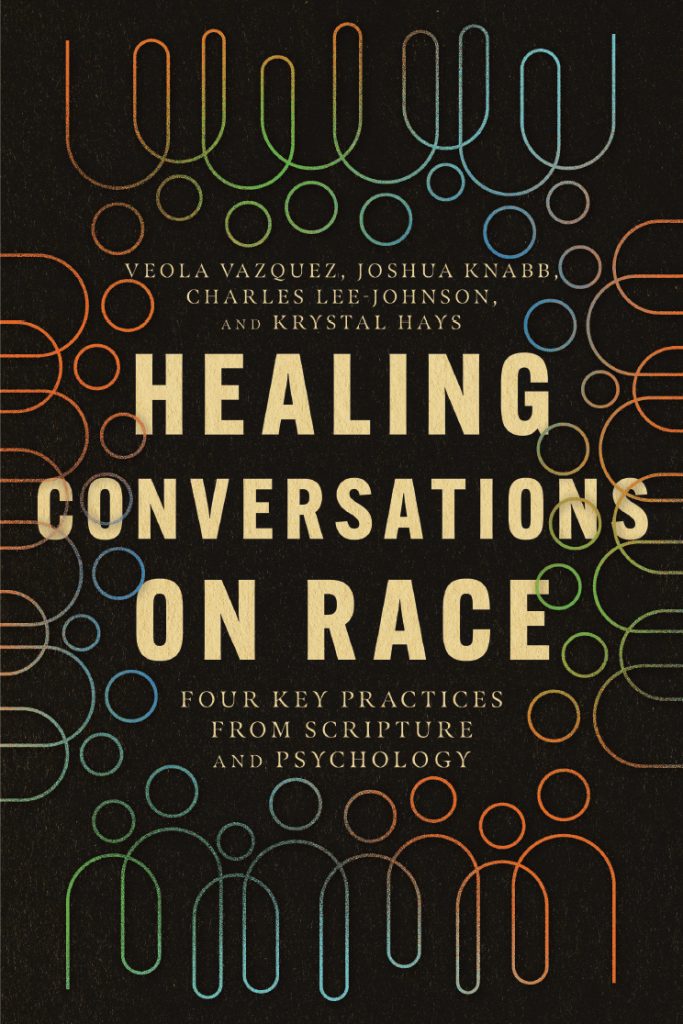Healing Conversations on Race: Acceptance
This is Part 3 of a 4-part blog post.
Read Part 1: Black History Month: A Call For Healing Conversations
Read Part 2: Healing Conversations on Race: The Role of Empathy in Building Christlike Racial Unity
Read Part 4: Healing Conversations on Race: Love
I remember standing in the check-out line at a Chevron station, staring at the candy shelf and wondering whether I should indulge in a pack of Whoppers. The man in line behind me slowly made his way next to me and smiled, saying, “Hey.” While I was preoccupied with the Whoppers, he moved a little closer and then asked a question that I always dreaded, “What are you?”
I didn’t know how I wanted to respond. I knew that he was asking about my race or ethnicity. As a biracial woman, I’d been asked the question many times in the past. But in this unexpected moment, my emotions took hold, and I felt many things at once. Initially, I was angry (I’d been minding my own business thinking about Whoppers) when the unwanted question was posed. I wanted to tell the man, “I’m a human.” As the line started to move, I chose, despite my anger, to say to him, “I’m mixed.” I then paid for my gas and left the Whoppers behind. Yet, even as I drove away from the Chevron, my pulse raced, and I felt flush, not knowing how best to respond to the many emotions I was experiencing.
Emotions can often feel unmanageable when we are in the heat of a sensitive moment like the one I described. This can be especially true when talking about race or race-related topics or when a person of color is faced with racism. So, what do we do with our feelings when we talk about these topics with others, especially when these conversations occur in the midst of our cross-racial relationships? According to the Healing Conversations on Race (HEAL) model (Vazquez et al., 2023), a key practice is the use of acceptance.

Acceptance (the A in the HEAL acronym) refers to the acceptance of emotions. Given that race-related topics can stir up strong emotions, finding ways to respond to these feelings in a helpful manner is important if we want to build and maintain cross-racial relationships. First, we need to differentiate between the two types of emotions we experience: primary emotions and secondary emotions.
Primary emotions are the initial, deeper, and more vulnerable emotions we often have when responding to topics of race and/or racism. These emotions might include fear, sadness, hurt, shame, or righteous anger. The good thing about primary emotions is that they remind us of our relational needs Greenberg & Paivio, 2003; Kobak et al., 2015). For example, sadness might remind us of a relational need for comfort from others, or fear might remind us of a relational need for others to help us feel safe. When we share our primary emotions and our needs in relationships with others, we connect with others on a deeper level than when we avoid these feelings and needs or attempt to ignore them altogether. In fact, this type of emotional sharing can even help heal old wounds created in cross-racial relationships (even if the person you share with did not create the wound; Makinen & Johnson, 2006).
On the other hand, secondary emotions mask or cover up our primary emotions and our relational needs. In conversations on race, secondary emotions might include frustration,
defensiveness, and unrighteous anger. Unfortunately, these are often the emotions we focus on when struggling to have conversations about race-related topics. Secondary emotions, though, create distance in relationships because they place a barrier between us and others by hiding our deeper, more vulnerable feelings and our relational needs.
As Christians, we believe that God created humans as emotional beings and that sharing emotions can bond us together in our relationships with others (Howard, 2018). Given that primary emotions provide signals for our needs within relationships, we believe that becoming aware of and accepting of your own, and others, primary emotions is a key practice in having conversations on race. As a strategy for doing this, we suggest practicing acceptance.

Photo by Annie Spratt on Unsplash
Acceptance can be described as an emotion regulation skill or coping skill. It is a means of tolerating your unpleasant thoughts and primary emotions rather than attempting to escape them or cover them up with secondary emotions. It includes non-judgmental observation of your own emotions and offering yourself compassion while you stay fully emotionally engaged with others (Knabb, Vazquez, et al., 2019; Knabb et al., 2021). For Christians, this includes inviting God into your emotional experience, asking for his presence, love, and active care in the midst of recognizing and responding to your primary emotions. You can do this by cultivating attention toward your emotions (concentrating on one emotion at a time), present-focus (focusing on the here-and-now rather than jumping to the future or the past in your mind), and awareness (recognizing/naming your thoughts and feelings with non-judgment) (Feldman et al., 2007; Knabb et al., 2019, 2021).
Returning to the story of my interaction at the Chevron station, what might have been different had I known then what I know now about acceptance? I might have slowed down my whirlwind of internal thoughts with present-focus and attempted to recognize and name my primary and secondary emotions without judging myself in the process. I might have noticed not only anger but also sadness and loss at, once again, feeling misunderstood and different from others. I then could have taken a moment to become aware of those feelings and invite God to be with me as I better sought to understand my relational need at that moment – to be accepted and understood. I could then have sought ways to reach out to others in my cross-racial community to ask for that relational need to be met.

To put acceptance into practice in your cross-racial relationships, here are a few questions to ask yourself during conversations about race-related topics:
• What are my current primary or secondary emotions?
• What are my emotions telling me about my current relational needs?
• What steps am I taking to actively engage in “acceptance” of my own and others’ emotions?
As you think about today’s blog post, I encourage you to share your thoughts about the following question:
· How might you have benefited in some of your prior conversations on race by practicing acceptance?

This blog is the third of 4 in our Black History Month Blog Series for 2023. Check back each Wednesday of February for more on how to have healing conversations. CBU Students who comment on these blogs will have a chance to receive a copy of the book. Winners will be emailed in early March. Listen. Learn. Engage.
References
Feldman, G., Hayes, A., Kumar, S., Greeson, J., & Laurenceau, J. (2007). Mindfulness and emotion regulation: The development and initial validation of the Cognitive and Affective Mindfulness Scale-Revised (CAMS-R). Journal of Psychopathology and Behavioral Assessment, 29, 177–190. https://doi.org/10.1007/s10862-006-9035-8
Howard, E. (2018). A guide to Christian spiritual formation: How Scripture, spirit, community, and mission shape our souls. Baker Academic. https://www.amazon.com/Guide-Christian-Spiritual-Formation-Scripture/dp/0801097800
Knabb, J., Vazquez, V., & Pate, R. (2019). “Set your minds on things above”: Shifting from trauma-based ruminations to ruminating on God. Mental Health, Religion & Culture, 22(4), 384-399. https://doi.org/10.1080/13674676.2019.1612336
Knabb, J. J., Vazquez, V. E., Pate, R. A., Garzon, F. L., Wang, K. T., Edison-Riley, D., Slick, A. R., Smith, R. R., & Weber, S. E. (2021a). Christian meditation for trauma-based rumination: A two-part study examining the effects of an internet-based 4-week program. Spirituality in Clinical Practice, 9(4), 253-271. http://dx.doi.org/10.1037/scp0000255
Makinen, J. A., & Johnson, S. M. (2006). Resolving attachment injuries in couples using emotionally focused therapy: Steps toward forgiveness and reconciliation. Journal of Consulting and Clinical Psychology, 74(6), 1055–1064. https://doi.org/10.1037/0022-006X.74.6.1055
Vazquez, V., Knabb, J. J., Lee-Johnson, C., & Hays, K. (2023). Healing conversations on race: Four key practices from scripture and psychology. IVP Academic. https://www.amazon.com/Healing-Conversations-Race-Practices-Psychology/dp/1514003929/
7 Comments
Accepting emotions is an extremely difficult task, especially when you’re in the heat of a conversation or even an argument. I appreciate this reminder a lot and it makes me think about how we are more likely to give excuses for our behavior than we are for others’ behavior. The same can be said for emotions as well and it can be easy to put labels on others for acting in ways that we would if we were in the same situation. Empathy and acceptance go hand-in-hand in this regard and I strive to embody both. Thank you for this!
Connor, thank you for engaging and sharing your thoughts about acceptance and it’s role in healing conversations. Although accepting emotions can be challenging given different circumstances, the fact that you are aware of this is a great step towards practicing acceptance and empathy as they often do go hand-in-hand.
Thanks for interacting with these blogs, Connor! Yes, empathy and acceptance together can help us engage in these difficult conversations. Both allow us to draw closer to others, even when we see things differently.
Dr. Vasquez, thank you so much for discussing how to process and handle emotions while engaged in conversations about race that may be uncomfortable. I thought that your perspective on this is valuable and relevant in our world today. Awareness, empathy, and self-control are virtues we need to continually and intentionally foster in ourselves as a people.
Bri,
Thank you for sharing your thoughts on acceptance and how it relates to healing conversations on race!
Bri,
Thank you for your comments. Yes, intentionality in fostering these skills is so important. It is an ongoing process!
Growing up I always received comments saying “I am not Mexican enough”. Although I have a lot of the features Latina’s have, and speak fluent Spanish, I also have fair skin. I always found offense to this comment since I felt people were questioning my identify and culture. This stirred up a lot of emotions for me. I think this is a great reminder that just because people will question our ethnicity, we will still love and accept all, as Christians.